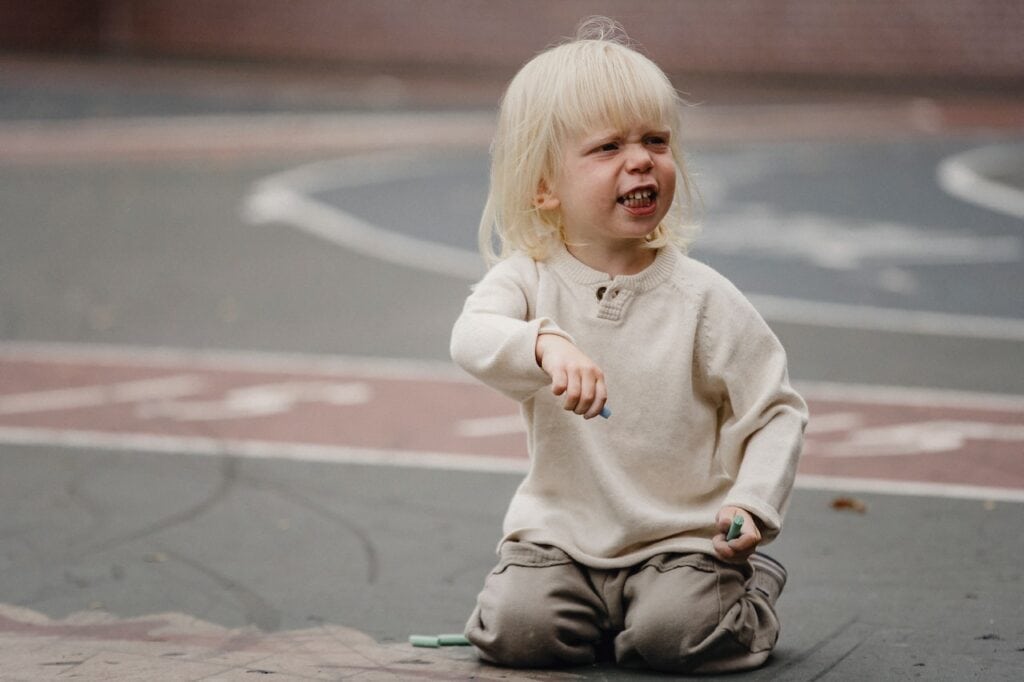Many parents of 3-year-olds are familiar with the challenges that come with raising a child who seems to be out of control. Tantrums, defiance, and power struggles can leave parents feeling helpless and frustrated. It’s important to remember that these behaviors are a normal part of development and can be managed with the right strategies.
Understanding Your 3-Year-Old’s Behavior is key to managing their behavior. At this age, children are learning to assert their independence and test boundaries. They are also developing their emotional regulation skills, which can lead to intense reactions to even minor triggers. By understanding the reasons behind their behavior, parents can respond in a way that is both effective and compassionate.
Common Issues and Symptoms of out-of-control behavior include hitting, biting, kicking, screaming, and refusing to follow directions. These behaviors can be triggered by anything from hunger to exhaustion to frustration. It’s important to recognize that these behaviors are not a reflection of a child’s character or worth, but rather a normal part of development. With patience, consistency, and the right strategies, parents can help their child learn to manage their emotions and behaviors.
Key Takeaways
- Understanding your child’s behavior is key to managing it effectively.
- Common issues and symptoms of out-of-control behavior include hitting, biting, and screaming.
- With patience, consistency, and the right strategies, parents can help their child learn to manage their emotions and behaviors.
Understanding Your 3-Year-Old’s Behavior
At the age of three, children are still learning how to regulate their emotions and behavior. It is normal for them to have occasional tantrums or outbursts, as they are still developing their self-control and impulse management skills. Understanding your child’s behavior can help you respond in a way that supports their learning and development.

1. Developmental Milestones
Three-year-olds are at a stage in their development where they are gaining more independence and exploring their environment. They are learning to communicate more effectively and are becoming more aware of their emotions. At this age, children are also developing their fine motor skills, which allows them to engage in more complex play and activities.
2. Emotions
Three-year-olds are still learning how to identify and manage their emotions. They may become frustrated or overwhelmed easily, leading to tantrums or outbursts. It is important to validate their feelings and help them find appropriate ways to express themselves. Teaching them simple coping strategies, such as taking deep breaths or counting to ten, can also be helpful.
3. Behavior
At this age, children may test boundaries and push limits as they explore their independence. They may engage in behaviors such as hitting, biting, or throwing tantrums. It is important to set clear expectations and consequences for behavior, while also providing positive reinforcement for good behavior. Consistency is key in shaping behavior and helping your child learn appropriate ways to express themselves.
4. Learning
Three-year-olds are constantly learning and absorbing information from their environment. They are curious and eager to explore, which can lead to a lot of questions and experimentation. Providing opportunities for learning through play and exploration can help support their development and foster a love of learning.
5. Preschooler and Kindergarten
As your child approaches preschool and kindergarten age, they will continue to develop their social and academic skills. It is important to provide opportunities for socialization and play with other children, as well as exposure to academic concepts such as letters, numbers, and shapes. This can help prepare them for the transition to school and set them up for success in their academic and social development.
Common Issues and Symptoms
When dealing with a child who is out of control, there are several common issues and symptoms that parents may notice. These can include crying, hitting, biting, kicking, tantrums, aggressive behavior, hyperactivity, oppositional defiant disorder (ODD), and outbursts.

Crying is a common symptom that young children may display when they are upset or frustrated. This can be a normal reaction to stress, but excessive crying can be a sign of something more serious.
Hitting, biting, and kicking are also common behaviors that young children may display when they are feeling angry or frustrated. These behaviors can be dangerous and may require intervention from parents or caregivers.
Tantrums are another common symptom that young children may display when they are feeling overwhelmed or frustrated. These can be particularly challenging for parents to manage, as they can be loud, disruptive, and may last for an extended period of time.
Aggressive behavior is a more serious symptom that may require professional intervention. This can include physical violence, verbal abuse, and other forms of aggressive behavior.
Hyperactivity is another common issue that parents may notice in young children who are out of control. This can include restlessness, fidgeting, and difficulty sitting still.
Oppositional defiant disorder (ODD) is a more serious condition that can cause children to display defiant, disobedient, and hostile behavior towards authority figures. This can be a challenging condition to manage and may require professional intervention.
Outbursts are another common symptom that parents may notice in young children who are out of control. These can be sudden, explosive displays of anger or frustration that can be difficult to manage.
Overall, it is important for parents to be aware of these common issues and symptoms when dealing with a child who is out of control. By understanding these behaviors and seeking professional help when necessary, parents can help their child to manage their emotions and develop healthier coping strategies.
The Role of Discipline and Consequences
Discipline is an essential aspect of parenting, especially when dealing with a child who is out of control. It involves setting boundaries and limits to guide a child’s behavior towards acceptable standards. Discipline should not be confused with punishment, which is meant to inflict pain or suffering as a means of controlling behavior. Instead, discipline should be focused on teaching and guiding a child towards better behavior.
Consequences are an important part of discipline. They help children understand that their actions have consequences and that they are responsible for their behavior. When a child misbehaves, it is important to establish consequences that are appropriate for the behavior. For example, if a child hits another child, a consequence may be a time-out or loss of privileges.
Time-out is a common consequence that involves removing a child from the situation in which they are misbehaving. This gives the child time to calm down and think about their behavior. Time-out should be brief and age-appropriate. For example, a three-year-old may need a time-out of three minutes, while a five-year-old may need a time-out of five minutes.
Loss of privileges is another consequence that can be effective. This involves taking away something that the child enjoys, such as screen time or a favorite toy. This consequence should be appropriate for the behavior and should not be excessive or unfair.
Restitution is another consequence that can be used to teach a child responsibility for their actions. This involves having the child make amends for their behavior, such as apologizing or helping to clean up a mess they made.
In summary, discipline and consequences are important tools for parents dealing with a child who is out of control. Discipline involves setting boundaries and limits, while consequences help children understand that their actions have consequences. Time-out, loss of privileges, and restitution are all effective consequences that can be used to guide a child’s behavior towards acceptable standards.
Strategies for Managing Behavior
When a 3-year-old child’s behavior is out of control, it can be challenging for parents to find effective strategies to manage it. However, there are several strategies that parents can use to help their child develop better behavior.

1. Stay Calm
One of the most important strategies for managing behavior is for parents to stay calm. Children can sense when their parents are upset or angry, which can make them more anxious and upset themselves. By staying calm, parents can help their child feel more secure and less anxious.
2. Pick Your Battles
Another important strategy is for parents to pick their battles. It’s important to focus on the most important behaviors that need to be addressed, rather than trying to correct every little thing. By prioritizing what is most important, parents can avoid overwhelming their child and themselves.
3. Consistency
Consistency is key when it comes to managing behavior. Parents should establish clear rules and expectations for their child and consistently enforce them. This helps children understand what is expected of them and reduces confusion and frustration.
4. Routine and Structure
Establishing a routine and structure can also be helpful in managing behavior. Children thrive on routine and predictability, and having a consistent schedule can help reduce anxiety and stress. This can include regular meal times, nap times, and bedtime routines.
5. Logical Consequences
Finally, parents can use logical consequences to help their child understand the consequences of their actions. Rather than punishing a child, logical consequences are designed to help the child learn from their mistakes and make better choices in the future. For example, if a child refuses to clean up their toys, they may lose the privilege of playing with them for a period of time.
By using these strategies, parents can effectively manage their child’s behavior and help them develop better habits and behaviors.
Promoting Positive Behavior
When dealing with a three-year-old child who is out of control, promoting positive behavior is crucial. Using positive language and reinforcing good behavior with praise can help encourage cooperation and reduce negative behavior.

One effective strategy is to use specific praise when the child exhibits good behavior. For example, instead of saying “good job,” say “great job sharing your toys with your friend.” This reinforces the specific behavior that you want to encourage and helps the child understand what they did well.
Another important aspect is to avoid negative language and instead focus on positive alternatives. For instance, instead of saying “stop running,” say “let’s walk together.” This helps the child feel empowered and encourages cooperation.
Involving the child in age-appropriate chores can also promote positive behavior. Giving them small tasks, such as putting away their toys or helping with meal preparation, can help them feel responsible and valued.
Overall, promoting positive behavior requires patience and consistency. By using positive language, reinforcing good behavior with praise, encouraging cooperation, and involving the child in chores, parents can help their three-year-old develop positive behavior patterns.
Dealing with Defiance and Power Struggles
When a child is out of control, defiance and power struggles can become a common occurrence. It is important for parents to understand how to handle these situations in a confident and knowledgeable manner.
One effective strategy is to establish clear household rules. This can help prevent arguments and power struggles from occurring in the first place. When a child knows what is expected of them, they are less likely to push boundaries and test authority.
However, even with clear rules in place, a child may still exhibit defiant behavior. In these situations, it is important for parents to remain calm and neutral. Reacting with anger or frustration can escalate the situation and make it more difficult to resolve.
Parents should also try to avoid getting into power struggles with their child. This can often lead to a cycle of arguing and defiance. Instead, parents can use positive reinforcement to encourage good behavior. Praising a child for following the rules can help reinforce positive behavior and reduce the likelihood of future power struggles.
In some cases, it may be necessary for parents to assert their authority. It is important for children to understand that their parents are in charge and that there are consequences for breaking the rules. However, parents should try to be consistent and fair in their discipline. This can help build trust and respect between parents and children.
Overall, dealing with defiance and power struggles can be challenging, but with clear rules, positive reinforcement, and consistent discipline, parents can help their child learn to follow the rules and behave appropriately.
Understanding and Handling Stress and Anxiety
Stress and anxiety are common emotions experienced by both children and adults. While stress is a normal part of life, excessive stress can lead to anxiety. Children can experience stress and anxiety due to various reasons, such as changes in routine, social interactions, academic pressure, and more. It is important for parents to understand how to identify and handle stress and anxiety in their children.

When a child is stressed or anxious, they may exhibit certain behaviors such as tantrums, crying, irritability, or even physical symptoms like headaches or stomachaches. Parents can help their children by providing a calm and supportive environment. Here are some ways to help your child manage stress and anxiety:
- Encourage open communication: Allow your child to express their feelings and emotions without judgment. Listen to them attentively and provide reassurance and support.
- Teach relaxation techniques: Deep breathing, visualization, and meditation are some techniques that can help your child relax and manage stress.
- Maintain a routine: Children thrive on routine and predictability. Try to maintain a consistent schedule for meals, playtime, and bedtime.
- Encourage physical activity: Exercise is a great way to reduce stress and anxiety. Encourage your child to engage in physical activities that they enjoy.
- Avoid over-scheduling: Too many activities can lead to stress and anxiety. Limit the number of activities your child participates in and prioritize their interests.
In conclusion, understanding and handling stress and anxiety in children is crucial for their overall well-being. By providing a supportive and calm environment, teaching relaxation techniques, maintaining a routine, encouraging physical activity, and avoiding over-scheduling, parents can help their children manage stress and anxiety effectively.
When to Seek Professional Help
If a 3-year-old child is consistently displaying negative behaviors that are impacting their daily life, it may be time to seek professional help. While some challenging behaviors are normal for children at this age, persistent and extreme behaviors can be a sign of a more serious issue.

Pediatricians are a good starting point for parents who are concerned about their child’s behavior. A pediatrician can evaluate the child’s physical and mental health to determine if there are any underlying medical conditions that may be contributing to the behavior.
If the pediatrician does not identify any medical issues, it may be time to seek help from a mental health professional. A mental health professional can evaluate the child’s behavior and provide a diagnosis if necessary. They can also provide parents with strategies and techniques to manage the child’s behavior.
Some common symptoms that may indicate a need for professional help include aggression, defiance, hyperactivity, impulsivity, and difficulty with social interactions. These behaviors can be disruptive to the child’s life and can also impact the family dynamic.
It is important for parents to remember that seeking professional help is not a sign of failure or weakness. It is a proactive step towards helping the child overcome their challenges and improving their quality of life.
Also, you might enjoy a related post on 3-Year-Old Behavior: Why It’s Getting Worse and What You Can Do About It
Frequently Asked Questions
What are some effective strategies for disciplining a 3-year-old?
Disciplining a 3-year-old can be challenging, but there are several strategies that can be effective. One approach is to use positive reinforcement, such as praising good behavior and rewarding positive actions. Another strategy is to set clear boundaries and consequences for misbehavior, such as time-outs or loss of privileges. It’s important to remain calm and consistent in discipline, and to avoid physical punishment.
How can I help my 3-year-old manage their emotions?
Three-year-olds are still learning how to regulate their emotions, so it’s important to provide them with tools to help them manage. One effective strategy is to teach them deep breathing or other relaxation techniques. Another is to encourage them to talk about their feelings and to validate their emotions. It’s also important to model healthy emotional expression and to provide a safe and supportive environment for your child.
What are some common causes of defiant behavior in 3-year-olds?
Defiant behavior in 3-year-olds can be caused by a variety of factors, including frustration with communication or language skills, a desire for independence, or a need for attention. It’s important to identify the underlying cause of the behavior in order to address it effectively.
Are there any warning signs that my 3-year-old’s behavior may be a cause for concern?
While some defiance and tantrums are normal for 3-year-olds, there are some warning signs that may indicate a more serious issue. These can include aggression towards people or animals, destruction of property, or self-harm. If you are concerned about your child’s behavior, it’s important to seek professional help.
How can I establish routines and boundaries to manage my 3-year-old’s behavior?
Establishing routines and boundaries can be helpful in managing a 3-year-old’s behavior. It’s important to set clear expectations and consequences for misbehavior, and to be consistent in enforcing them. Creating a predictable routine can also help your child feel more secure and reduce anxiety.
What are some resources or professionals I can turn to for help with my 3-year-old’s behavior?
There are several resources and professionals who can help with managing a 3-year-old’s behavior. These can include pediatricians, child psychologists, or parenting classes. It’s important to find a resource or professional who is knowledgeable about child development and can provide evidence-based strategies for managing behavior.

Iesha is a loving mother of 2 beautiful children. She’s an active parent who enjoys indoor and outdoor adventures with her family. Her mission is to share practical and realistic parenting advice to help the parenting community becoming stronger.
